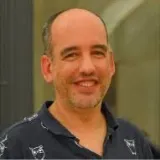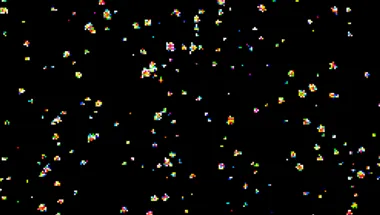
Professor Sergio Padilla-Parra
Professor in Virus Imaging and Biophotonics
Research interests
- Cell Biology
- Immunology
Contact details
Biography
Sergio completed a Masters in Chemistry at Lund University (Sweden) with 1st Class Honours in 2005. After that, he was enrolled as Research Assistant at the Niels Bohr Institute in Copenhagen (Denmark). There, he developed mathematical models applied to biological systems; a project funded by the European Commission and supervised by Kirstine Berg-Sorensen. In 2006 he was awarded a Marie Curie Ph.D fellowship to continue his research career at Institut Jacques Monod, Paris. Sergio completed his Ph.D studies in 2009 under the supervision of Marc Tramier and Maite Coppey-Moisan on the development of advanced lifetime imaging microscopy applied to host-pathogens interactions. In collaboration with Guy Tran Van Nhieu (at that time at Institut Pasteur and currently at College de France) he investigated how actin dynamics where altered in the host during Shigela entry. At this point of his career, Sergio already had experience in mathematical modelling, advanced light microscopy, molecular biology and imaging live cells while being infected by Shigella.
Sergio went to Emory University (Atlanta, USA) to start a postdoc under the supervision of Gregory Melikyan. He studied retrovirus entry and fusion employing time-resolved light microscopy. In particular, he studied how Avian Sarcoma and Leukosis Virus (ASLV) entered the cell employing different endosomal routes depending on the receptor isoform utilised (either TVA800 or TVA950). He also studied Human Immunodeficiency Virus 1 (HIV-1) entry and fusion and there he learnt advanced virology and microscopy techniques such time-resolved sinlge virus tracking (SVT) and functional assays on virus fusion (Padilla-Parra et al., PNAS, 2012 and Padilla-Parra et al., Plos Pathogens, 2012).
Sergio established and consolidated his independent laboratory by a Nuffield Department of Medicine (NDM) Leadership Fellowship (University of Oxford) 2013-2020 and European Research Council (ERC) Consolidator award (2019 -2025) respectively. These awards have helped him to establish a group studying enveloped retrovirus fusion (such as HIV) utilising advanced single molecule approaches. His group has helped to solve the controversy of the whereabouts of HIV fusion (which occurs in the plasma membrane of T Cells but within endosomal compartments in macrophages (Jones et al, Cell Reports 2017 and Russell et al., Cell Reports 2017 and reviewed in Jakobsdottir et al., Trends Mol Med, 2017). His group, in collaboration with the Bowden lab (University of Oxford), has also been the first one to define the time-resolved stoichiometry of the HIV fusion reaction in live cells (Iliopoulou et al., NSMB, 2018).
Research

Padilla-Parra Lab
We employ advanced single molecule imaging approaches to understand enveloped virus fusion mechanics. We use a highly interdisciplinary approach that combines, virology, molecular biology, advanced biophysics live cells imaging and single molecule spectroscopy to define virus fusion molecular machines. In particular we investigate a number of enveloped viruses during the first steps of infection (virus entry and fusion) that comprise Human Immunodeficiency Virus 1 (HIV-1), Ebola (EBOV) and SARS Corona viruses (SARS CoV 2).

The Rosalind Franklin Institute
The Rosalind Franklin Institute (RFI) in Harwell, is a national Institute formed in partnership with King’s and other leading universities and funded by UKRI

Translational Research & Innovation in Microbial Sciences (TRIMS) - King’s Prize Doctoral Programme
This PhD programme is designed to tackle microbial challenges through cutting-edge technological innovation, fundamental and applied science with translational impact.
Events

Inaugural Lectures: Professors Sergi Padilla-Parra & Paul Taylor
Inspiring talks from two of our new professors about their work, their specialisations, and their journeys to where they are today.
Please note: this event has passed.
Features
5 minutes with Sergio Padilla-Parra
Dr Sergio Padilla-Parra is a Senior Lecturer affiliated with the Department of Infectious Diseases, School of Immunology & Microbial Sciences, and the Randall...

Research

Padilla-Parra Lab
We employ advanced single molecule imaging approaches to understand enveloped virus fusion mechanics. We use a highly interdisciplinary approach that combines, virology, molecular biology, advanced biophysics live cells imaging and single molecule spectroscopy to define virus fusion molecular machines. In particular we investigate a number of enveloped viruses during the first steps of infection (virus entry and fusion) that comprise Human Immunodeficiency Virus 1 (HIV-1), Ebola (EBOV) and SARS Corona viruses (SARS CoV 2).

The Rosalind Franklin Institute
The Rosalind Franklin Institute (RFI) in Harwell, is a national Institute formed in partnership with King’s and other leading universities and funded by UKRI

Translational Research & Innovation in Microbial Sciences (TRIMS) - King’s Prize Doctoral Programme
This PhD programme is designed to tackle microbial challenges through cutting-edge technological innovation, fundamental and applied science with translational impact.
Events

Inaugural Lectures: Professors Sergi Padilla-Parra & Paul Taylor
Inspiring talks from two of our new professors about their work, their specialisations, and their journeys to where they are today.
Please note: this event has passed.
Features
5 minutes with Sergio Padilla-Parra
Dr Sergio Padilla-Parra is a Senior Lecturer affiliated with the Department of Infectious Diseases, School of Immunology & Microbial Sciences, and the Randall...

